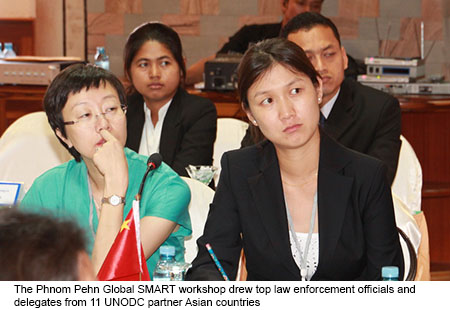
Phnom Penh (Cambodia), 26 July 2012 - The intensification of the methamphetamine problem in East and Southeast Asia remains the greatest drug challenge in the region, delegates were told at the UNODC Global Synthetics Monitoring: Analyses, Reporting and Trends (SMART) Programme regional workshop held in Phnom Penh on 24-25 July 2012.
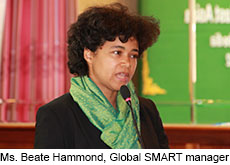 Over the past few years, the manufacture, trafficking and use of amphetamine-type stimulants (ATS) have continued to expand throughout the region. "Methamphetamine is the most widely used ATS drug in the region," said Ms. Beate Hammond, Global SMART manager, "because it remains the easiest to produce and the precursor chemicals are widely available."
Over the past few years, the manufacture, trafficking and use of amphetamine-type stimulants (ATS) have continued to expand throughout the region. "Methamphetamine is the most widely used ATS drug in the region," said Ms. Beate Hammond, Global SMART manager, "because it remains the easiest to produce and the precursor chemicals are widely available."
That methamphetamine has become the leading drug concern in most countries in the region is no coincidence. Cambodia, which had previously been primarily a transit route for the trafficking of drugs and precursor chemicals to global markets, has recently become a major consuming and manufacturing country of ATS drugs.
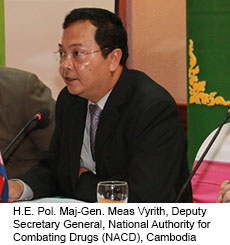 "International drug traffickers now link Cambodia to other countries in the region and beyond", said H.E. Pol. Maj-Gen. Meas Vyrith, Deputy Secretary General of the National Authority for Combating Drugs (NACD) of Cambodia. He added that ATS use, once concentrated in Phnom Penh and other major urban areas, now affects nearly all parts of the country.
"International drug traffickers now link Cambodia to other countries in the region and beyond", said H.E. Pol. Maj-Gen. Meas Vyrith, Deputy Secretary General of the National Authority for Combating Drugs (NACD) of Cambodia. He added that ATS use, once concentrated in Phnom Penh and other major urban areas, now affects nearly all parts of the country.
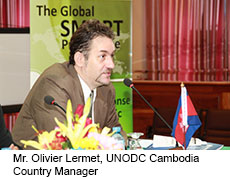 "To respond to the problem, East and Southeast Asia countries must gather evidence to get the facts right in order to carry out effective policies, foster regional cooperation and provide technical assistance to other countries when requested," said Olivier Lermet, Country Manager UNODC Cambodia Country Office.
"To respond to the problem, East and Southeast Asia countries must gather evidence to get the facts right in order to carry out effective policies, foster regional cooperation and provide technical assistance to other countries when requested," said Olivier Lermet, Country Manager UNODC Cambodia Country Office.
"Knowing is the first step in responding," said Gary Lewis, UNODC Regional Representative for East Asia and the Pacific. The four elements necessary to formulate a strategic response to the problem are knowledge; a framework of laws, conventions and norms; the technical capacity to respond; and a reach across borders, Mr. Lewis added. "Law enforcement and public health officials must form a network to effectually respond to the network of transnational organized criminals operating in our region."
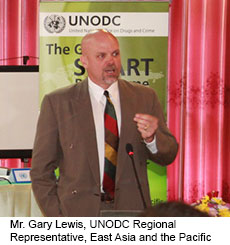 Global SMART Programme Regional Workshop participants were updated on the Programme's implementation and exchanged information on the regional ATS situation and national responses to it. They also discussed the threats and challenges posed by the emergence of new psychoactive substances on the market and future regional SMART implementation steps including the data-sharing Drug Abuse Information Network for Asia and the Pacific (DAINAP).
Global SMART Programme Regional Workshop participants were updated on the Programme's implementation and exchanged information on the regional ATS situation and national responses to it. They also discussed the threats and challenges posed by the emergence of new psychoactive substances on the market and future regional SMART implementation steps including the data-sharing Drug Abuse Information Network for Asia and the Pacific (DAINAP).
Participants included more than 40 law enforcement officers, intelligence analysts, health practitioners, forensic scientists, and delegates from the 11 SMART UNODC partner countries - Brunei Darussalam, Cambodia, China, Indonesia, the Lao People's Democratic Republic, Malaysia, Myanmar, the Philippines, Singapore, Thailand and Viet Nam.
 Representatives from INTERPOL and the World Customs Organization Regional Intelligence Liaison Office Asia and the Pacific, and the Ministry of Health, Labour and Welfare of Japan delivered informative and thought-provoking presentations on the latest trends in trafficking of synthetic drugs in East and South-East Asia. The Australian Federal Police, New Zealand Police and U.S. Drug Enforcement Agency were also represented.
Representatives from INTERPOL and the World Customs Organization Regional Intelligence Liaison Office Asia and the Pacific, and the Ministry of Health, Labour and Welfare of Japan delivered informative and thought-provoking presentations on the latest trends in trafficking of synthetic drugs in East and South-East Asia. The Australian Federal Police, New Zealand Police and U.S. Drug Enforcement Agency were also represented.
The data shared bythe eleven partner countries and findings gathered during the workshop will be reflected in the Global SMART Programme's annual ATS regional report, Patterns and Trends of Amphetamine-Type Stimulants and Other Drugs, Asia and the Pacific . The 2012 report will be published this coming fall. The Programme also publishes the semi-annual Global SMART Update to provide regular brief reporting on emerging patterns and trends of the rapidly evolving global synthetic drug situation.
UNODC launched the Global SMART Programme in September 2008 to enhance the capacity of member states and authorities in East and Southeast Asia to generate, manage, analyse and report synthetic drug information, and to apply this evidence-based knowledge to policy and programme design.
The UNODC Global SMART Programme receives financial support from the Governments of Australia, Canada, Japan, New Zealand, the Republic of Korea, Thailand and, most recently, the United States.